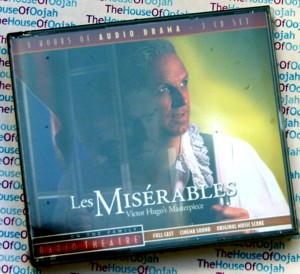Les Miserables - Victor Hugo - Dramatised Audio CD

Les Miserablesby Victor HugoAudio Drama |
 |
Les Miserables - Victor Hugo - Audio Drama CDBrand New : Audio Drama 3 Audio CDs 169 minutes - not recommended for children under 8 The story that has thrilled millions comes to life in a brand new way in Focus on the Family Radio Theatre’s Les Miserables. This audio drama beautifully portrays the redeeming power of forgiveness through the story of Jean Valjean, an embittered convict whose life is changed by a single act of kindness. Recorded in London with some of England’s finest actors, it will mesmerize adults and families alike. About the Author Victor HugoVictor-Marie Hugo (26 February 1802 – 22 May 1885) was a French poet, playwright, novelist, essayist, visual artist, statesman, human rights activist and exponent of the Romantic movement in France. In France, Hugo's literary reputation rests primarily on his poetic and dramatic output and only secondarily on his novels. Among many volumes of poetry, Les Contemplations and La Légende des siècles stand particularly high in critical esteem, and Hugo is sometimes identified as the greatest French poet. Outside France, his best-known works are the novels Les Misérables and Notre-Dame de Paris (sometimes translated into English as The Hunchback of Notre Dame). Though extremely conservative in his youth, Hugo moved to the political left as the decades passed; he became a passionate supporter of republicanism, and his work touches upon most of the political and social issues and artistic trends of his time. He is buried in the Panthéon. Victor Hugo was the third and last son of Joseph Léopold Sigisbert Hugo (1773–1828) and Sophie Trébuchet (1772-1821); his brothers were Abel Joseph Hugo (1798–1855) and Eugène Hugo (1800–1837). He was born in 1802 in Besançon (in the region of Franche-Comté) and lived in France for the majority of his life. However, he was forced into exile during the reign of Napoleon III — he lived briefly in Brussels during 1851; in Jersey from 1852 to 1855; and in Guernsey from 1855 to 1870 and again in 1872-1873. There was a general amnesty in 1859; after that, his exile was by choice. Hugo's early childhood was marked by great events. The century prior to his birth saw the overthrow of the Bourbon Dynasty in the French Revolution, the rise and fall of the First Republic, and the rise of the First French Empire and dictatorship under Napoléon Bonaparte. Napoléon was proclaimed Emperor two years after Hugo's birth, and the Bourbon Monarchy was restored before his eighteenth birthday. The opposing political and religious views of Hugo's parents reflected the forces that would battle for supremacy in France throughout his life: Hugo's father was a high-ranking officer in Napoléon's army, an atheist republican who considered Napoléon a hero; his mother was a staunch Catholic Royalist who is believed to have taken General Victor Lahorie as her lover, who was executed in 1812 for plotting against Napoléon. Since Hugo's father, Joseph, was an officer, they moved frequently and Hugo learned much from these travels. On his family's journey to Naples, he saw the vast Alpine passes and the snowy peaks, the magnificently blue Mediterranean, and Rome during its festivities. Though he was only nearly six at the time, he remembered the half-year-long trip vividly. They stayed in Naples for a few months and then headed back to Paris. Sophie followed her husband to posts in Italy (where Léopold served as a governor of a province near Naples) and Spain (where he took charge of three Spanish provinces). Weary of the constant moving required by military life, and at odds with her unfaithful husband, Sophie separated temporarily from Léopold in 1803 and settled in Paris. Thereafter she dominated Hugo's education and upbringing. As a result, Hugo's early work in poetry and fiction reflect a passionate devotion to both King and Faith. It was only later, during the events leading up to France's 1848 Revolution, that he would begin to rebel against his Catholic Royalist education and instead champion Republicanism and Freethought. Hugo's religious views changed radically over the course of his life. In his youth, he identified himself as a Catholic and professed respect for Church hierarchy and authority. From there he became a non-practising Catholic, and expressed increasingly violent anti-catholic and anti-clerical views. He dabbled in Spiritualism during his exile (where he participated also in seances), and in later years settled into a Rationalist Deism similar to that espoused by Voltaire. A census-taker asked Hugo in 1872 if he was a Catholic, and he replied, "No. A Freethinker". Hugo never lost his antipathy towards the Roman Catholic Church, due largely to what he saw as the Church's indifference to the plight of the working class under the oppression of the monarchy; and perhaps also due to the frequency with which Hugo's work appeared on the Pope's list of "proscribed books" (Hugo counted 740 attacks on Les Misérables in the Catholic press). On the deaths of his sons Charles and François-Victor, he insisted that they be buried without crucifix or priest, and in his will made the same stipulation about his own death and funeral. However, although Hugo believed Catholic dogma to be outdated and dying, he never directly attacked the institution itself. He also remained a deeply religious man who strongly believed in the power and necessity of prayer. Hugo's Rationalism can be found in poems such as Torquemada (1869, about religious fanaticism), The Pope (1878, violently anti-clerical), Religions and Religion (1880, denying the usefulness of churches) and, published posthumously, The End of Satan and God (1886 and 1891 respectively, in which he represents Christianity as a griffin and Rationalism as an angel). "Religions pass away, but God remains", Hugo declared. Christianity would eventually disappear, he predicted, Template:Act but people would still believe in "God, Soul, and the Power." |
Les Miserables - Victor Hugo - Audio Drama CD |

 0 Items (Empty)
0 Items (Empty)